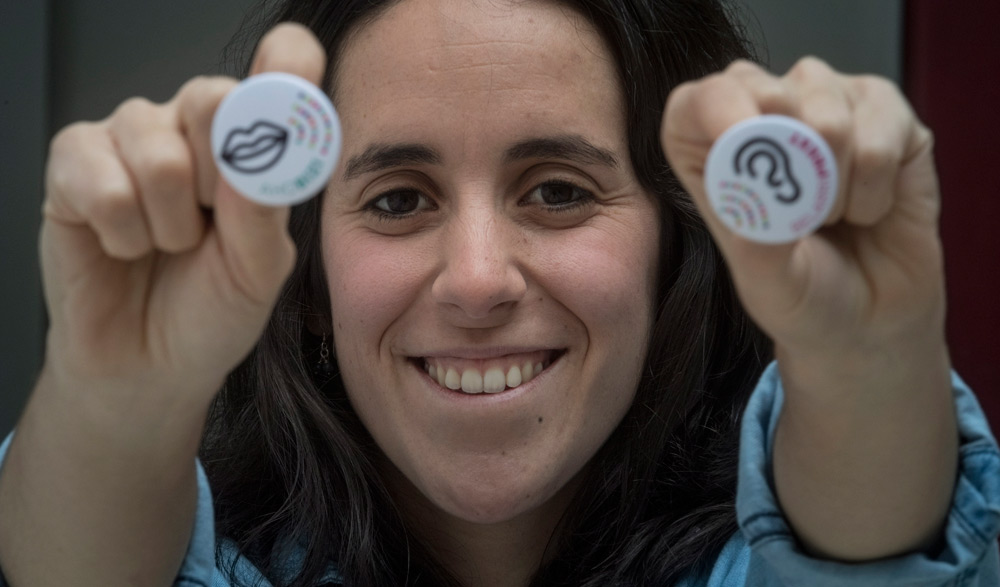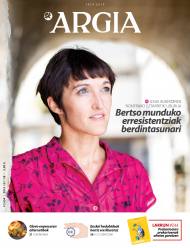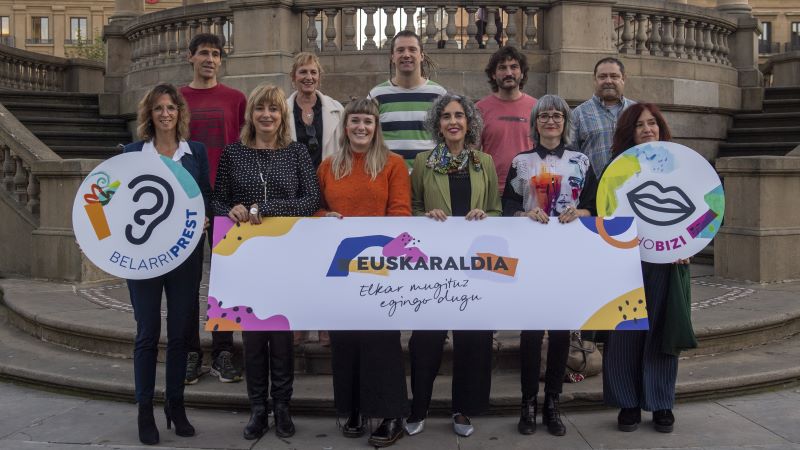"Ahobizi and Belarriprest, both are active roles and you have to take steps in both"
- The second edition of Euskaraldia will begin on 20 November 2020. It seems distant, but the organisers have already got to work. The novelties of this edition are the spaces for innovation. Arigunea is a collective space in which those who understand Basque and those who know Basque come together to speak in Basque. They may be companies, associations or public bodies. We have talked about Arigune with Arrate Illaro and the need to deepen the roles of ahobizi and belarriprest.

The Public Commissions, Topagune and the Basque Government, and the entities with areas, each of them, in the identification, impulse and creation of arigunes:
As for the activation of the arigunes, the work of the local committees and the general coordination group [Topagune and the Basque Government] is very similar, the field of influence is different. The general coordination agents will try to activate the supramunicipal entities, even if they are branches in the municipality. Assemblies will not have to go to the local store or branch of the savings bank. The Committee on the Rules of Procedure, the Verification of Credentials and Immunities can go, if it wishes, but that requires a great deal of strength. The popular commissions will be transferred to associations, companies and public institutions based in the municipality. For example, you won't have to go to the health center, we're going to go to Osakidetza. When I say we mean that sometimes the Basque Government, sometimes the Topagune, sometimes the Members of Parliament, will go. We have the division of functions done. Our task and the work of the local committees is to activate citizens and entities.
Local commissions will have to prioritize, because it is not possible to go to all the entities, it is a lot of work. We too will do the same, we will think about what kind of entities we want with us and we will go to them. There are different ways to approach them: visits, presentations... The Public Boards may use the City Hall to send letters to potential points of sale.
Another thing is to create arigunes. This work will be carried out by the entities. Its work is divided into two parts: on the one hand, it will be the work of the directorates or responsible to identify the groups that can be arigune, in which all the members understand at least the Basque. They'll talk to them. On the other hand, members will decide whether they are arigunes or not, whether or not they participate as ahobizi or belarriprest. If they decide to do so, the institution shall support and facilitate its practice.
Arigune can be created in both directions. Management can say “we create a space here” or members of the entity can say “here we can create a space”. In any case, the creation of an arigune will be decided by those inside the entity.
I imagine the popular committees promoting, rather than pushing, looks outward in the entities, because whoever looks outward receives the citizen. And those who cannot be arigune I imagine to be arigune, that is, we know that in that entity they are not able to attend them in Euskera, but we want them to be cared for.
There's a vacuum there, but it's kind of like drowning and belarriprest. There are Euskaltzales that don't know Euskera and can't put the veneer. This shows that a leap is needed to be able to perform the exercise. Suppose that in a trade there are no conditions to complete the arigune internally or to serve the citizens, because they do not have anyone who can do so in Basque. This entity cannot be arigune, but can register to receive information, so that it knows what it can do from now on to take steps, so that at some point it becomes a possible arigune (then the members will decide whether it is arigune or not). We are preparing a fund to hand it over to these entities.
In the first edition we received the following message: “We don’t have people who can be drowning and belarriprest, but what can we do?” If with the excuse of Euskaraldia we get some of them interested… From Euskaraldia we can do no more than that. For some you can exercise and for others you can activate. In the first edition the main focus has been the change of language habits, but we have realized that many people have reflected on their linguistic habits and reflection is a step before the change of language habits. That's also interesting -- it's not an exercise, but it serves to bring about social rules. The entities say: the citizens have the right to speak in Basque with us and, therefore, what do we have to do to ensure that? If you give them what to think, it's that there's a need.
He said that one of the functions of the local committees is the activation of the entities. Public institutions, on the other hand, have an obligation to guarantee the rights of those who wish to express themselves in Basque. The Health Center and the Sports Association are the two entities, but they have very different responsibilities in terms of language. Isn't it ridiculous that the grassroots commission is urging to create an arigune in the pediatric department of the local health center? Does this work fall to the local commission?
Public institutions must follow their path, because they have their own conditions. They must do so in Basque if they are asked to do so, but they must do so in Spanish if the citizens so wish. So maybe that person can't be a whim. That is why I say that they have to make their way. The assemblies should activate popular associations, but Osakidetza is a public body and is dependent on the Basque Government. The Basque Government has the Vice-Ministry of Language Policy and should ensure that this Department passes and influences other departments.
For example, we will inform the village commissions of the arigunes that will be created in the outpatient clinics and in the residences of the elderly, so that the commissions know which are participating in Euskaraldia.

We citizens also make individual activations, we demand that entities speak to us in Basque continuously.
In this edition there is a risk that people will understand that Euskaraldia will take place in the entities, that is, in the arigunes. Arigune's point is to add, the same will be true of the previous Euskaraldia. We will be drowning and belarriprest and some of them will participate at some point.
In the case of Ahobizi and Belarriprest, you intend to delve into what both roles mean.
One of the main communication foci will be to explain the roles of ahobizi and belarriprest, so that it is not understood that we are talking about linguistic competence, but about behavior. You can be a person who does well in Basque and be belarriprest. If you're going to do it at all times, you're drowning with those who understand Euskera, but if you're not going to do it at all times, but many times yes, and also, if you're going to actively ask others to do it, then you'll be attentive. And it may not do one thing or another, even if it does very well in Basque. They are too.
If it comes to changing language habits, is it not logical to encourage people capable of being drowning?
It depends. We want to go up the stairs and we can go up one by one, two by two or three by three, we can't go up five. For some, even if they are well-adapted in Basque, going from speaking in Spanish to speaking in Basque is a very exhausting exercise, it requires a lot of energy, a lot of tension, you can feel very uncomfortable and small. I'm from Algorta and I have friends from Uribe Kosta. We are all boys and girls of the ikastola, some of us have the habit of developing ourselves in Euskera and others not, but all of us manage in Euskera. More than half of the crew was belarriprest, and more than half of the crew spoke in Basque and reflected on the subject. It depends on everyone's starting point. It's not easy.
From the moment you realize that the language is going to change, we must think that the citizen is willing to exercise, knowing that the role of ahobizi is demanding. But what sense does it make to be deaf ears what it should be? Isn't it better not to participate if you don't have strength?
Somehow, we can all run, but it's not the same running from time to time as being prepared to run the marathon. If I'm a beginner, I'll start with 20 minutes, then 30 minutes -- depending on the starting point we have. I've noticed development in my crew.
In that profile, but to a large extent in the areas that live in Euskera? Is there no danger in a basket? That is, the one who speaks a lot in Basque takes the role of belarriprest and I will not say that I turn back, but that I do not advance in anything?
But there's something else that depends on how much you're willing to give it. It's not 0 or 100. I would like all those who know Euskera to speak in Basque and we would not need Euskaraldia. It is one thing that we want those Euskaltzales to be active and another that each one wants to be.
Example of plastic consumption. Some are very conscious and have taken the plastic out of their lives and others say “I’m going to start carrying my bag when I go to the store.” Everyone will decide what they are prepared to give. The initiative needs flexibility because it is better to give 50 than to give 0.
"The entities say: the citizens have the right to speak in Basque with us and, therefore, what do we have to do to guarantee it? If you give them what to think, it’s a sign that there’s need.”
I still think that there is a risk of emptying citizens in areas of high knowledge and use, or of not improving customs.
Another option is that, in the name of adaptability, the Zestoa people’s council should do its work with the citizens and say: let us do everything you can because we have the conditions to be drowning. It is up to the people's committee.
I wanted to say that the socio-linguistic characteristics of the population should be taken into account.
And what is the usage data like? We have to go further.
That's what I wanted to say, some of them are up high and how you present roles and how flexible you are, there's a risk that some citizens won't go up.
Although Belarriprest can also make 95% of the talks in Basque, it is true that in fifteen days it is a matter of making a further leap in our linguistic customs, of doing more than we did before. Everyone will see their starting point and what is in their interests.
That is, Belarriprest's role doesn't help.
Because we consider it a passive role: tell me about Euskera, and I will remain the same. We must also try to speak in Basque in Belarriprest, even if they are dismissed. Both are active roles and steps must be taken in both if the exercise is performed correctly.
What will Euskaraldia be like in 2020?
As in 2018, there will be drownbizi and belarriprest. Innovation in 2020 is a space for entities, whether small businesses, department stores, public institutions, workshops or local associations, to speak in Basque.
The next Euskaraldia will not be at the end of 2019, but in 2020. On this occasion, however, preparatory work will continue for a year and a half. The Basque Year will be held between 20 November and 4 December 2020. It is therefore a 15-day exercise.
Like last year, the Ahobizi and Belarriprest will play a major role in the programming of the fair. However, the organizers of Euskaraldia want to make a greater effort this year to better explain both roles and to make the exercise deeper and more demanding. Last year the two roles were related to linguistic competence, so a special effort will be made to explain what each role means. Like last year, identification plates will be worn on the chest. In 2018, 225,000 people were registered. The organizers want more people to participate, as in the Basque Country the number of people who understand the Basque Country is higher than in the Basque Country.
Innovation in 2020 will be a meeting point. Arigunea is a collective space in which those who understand Basque and those who know Basque come together to speak in Basque. Entities, i.e. any type of public entity, business, trade or public association, shall facilitate the creation of such spaces, and persons in such spaces shall demonstrate their willingness to participate in the exercise. The organizers of Euskaraldia will work in the creation and identification of arigunes. Arigunes can be created by looking inwards or outwards. For example, looking inside, the meetings of a company can be made in Basque because the participants have the capacity to understand the Basque and because in the company they have decided to turn these meetings into a common space between management and workers. Looking outward, a large trade can create an arigune with sellers to serve the buyers in Basque.
Three questionnaires were distributed among the people who participated in the Basque Country in 2018 and from there, the results of the study will be released at the end of September.
The main organizers of Euskaraldia are the same as last year: Vice-Ministry of Language Policy of the Basque Government and Euskaltzaleen Topagunea. Together with them will be Euskarabidea, Euskararen Erakunde Publikoa and Euskal Elkargoa.
Year and Half schedule
In Euskaraldia in
2018, 405 popular commissions were created in Euskal Herria. Many were dissolved at the end of Euskaraldia, others have advanced. The registration of the local commissions of Euskaraldia, to be held in 2020, has already begun. Commissions may be registered until December.
Entities
The first step is to analyze if they are able to create an arigune, that is, if the members of the space have the capacity to understand the Basque. Registration for this exam will take place between October 2019 and July 2020. After the examination, the deadline for registering as arigune will be opened in November 2019 and closed in July 2020.
Ahobiziak and belarriprest
will be able to register from September 2020.
Euskaraldia comes back. Apparently, it will be in the spring of next year. They have already presented it and the truth is that it has surprised me; not Euskaraldia himself, but his motto: We'll do it by moving around.
The first time I have read or heard it, the title of the... [+]
The Basque country is about to finish writing these lines, the end is still insufficient. They will certainly be beautiful, similar to those of a great party.
In Bizkitarte I have carefully read, here or in other publications, lines written by people more expert than I, let us... [+]
On November 18, the “Euskaraldia” began, an initiative that aims to promote the use of Euskera among Basque speakers and non-Basque speakers for two weeks. Although I believe that this initiative has shortcomings in some contexts and there is no better veneer than “Good... [+]
Ariketa kolektibo bat egingo du Gazte Euskaltzaleen sareak azaroaren 14tik 18ra, gazteen artean euskaraz bizitzeko hautua bultzatzeko eta horretarako oztopo diren "egiturazko baldintzak" azaleratzeko.


















